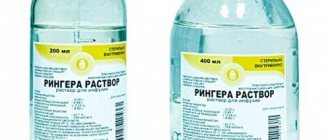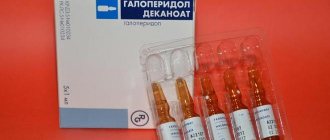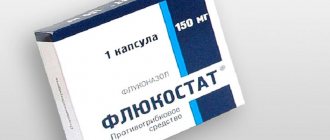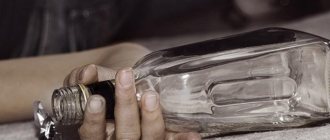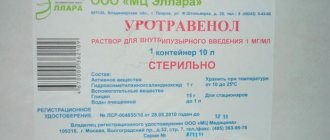An increase in blood viscosity is a reason for a comprehensive diagnosis of the body, because in the absence of timely therapy, destructive and sometimes irreversible processes can begin in many systems and organs. The first step in the presence of an illness is to prescribe a dropper of Reopoliglucin - a plasma-substituting drug that prevents disruption of suspension blood stability and restores blood flow in small capillaries.
More details Reopoliglyukin
This is a solution for infusion, containing a dextran solution. It improves blood flow in small capillaries, reduces intoxication of the body, normalizes blood circulation in tissues, and reduces blood viscosity.
The medicine increases the pressure in the primary urine, which helps remove poisons, decay products and toxins from the patient’s body. The use of the drug allows you to increase diuresis and increase the volume of circulating blood. In people who suffer from vascular insufficiency, blood pressure rises and plasma volume increases. At the same time, the medicine has low toxicity.
The introduction of a drip reduces the likelihood of blood clots after surgery and fractures by affecting the fibrin structure. After the medicine, the viscosity of the blood changes, which increases the clotting period.
Contraindications
Absolute:
- pulmonary edema;
- DHF (decompensated heart failure);
- thrombocytopenia;
- severe renal failure, accompanied by oligo- and anuria;
- ongoing internal bleeding;
- hypocoagulation;
- hemorrhagic stroke;
- traumatic brain injuries accompanied by increased intracranial pressure;
- overhydration, hypervolemia, other situations in which the administration of large volumes of fluids is contraindicated;
- hypersensitivity to any of the components of the solution.
Relative (use with caution):
- disorders of the blood coagulation system;
- dehydration;
- diabetes mellitus with severe hyperglycemia;
- hyperosmolarity;
- disturbances of water and electrolyte balance.
During pregnancy, Reopoliglucin is administered if the expected benefit to the mother is higher than the possible risk to the fetus.
During lactation, breastfeeding should be interrupted during drug therapy, since there is insufficient reliable clinical data on the effect of dextran on the child’s health.
When to use
Administration of the drug intravenously is possible in case of deterioration of blood flow of various etiologies. With the help of such a dropper, doctors recommend relieving symptoms of shock in case of burns, injuries, and painful shock conditions. They help with poor capillary and venous circulation. This drug is used for the prevention and complex treatment of thrombosis and thromboembolism.
Droppers with medicine are used during heart surgery when using a heart-lung machine. The drug is used to remove toxins from the body in cases of diagnosed pancreatitis and peritonitis. It is also used for intoxication in case of burns.
Reopolyglucin is administered dropwise for pathologies of the optic nerve and other visual impairments, including inflammation of the cornea. The medicine is used in complex therapy for severe infections with intoxication of the body.
When not to use the medicine
It is prohibited to use the drug if you are allergic to the components of the drug. It is not used for kidney disease or in the presence of thrombocytopenia. You should not use droppers with it if you have circulatory problems in the decompensation stage.
It should not be used if the patient had problems with intracranial pressure or had traumatic brain injuries. Do not use droppers for hemorrhagic stroke or internal bleeding.
Indications for use
- shock (traumatic, surgical and burn) - prevention and treatment;
- circulatory disorders (arterial, venous, capillary) - prevention and treatment of thrombophlebitis, thrombosis, endarteritis, Raynaud's disease;
- surgical interventions on the heart performed using a cardiopulmonary bypass (heart-lung machine) - addition to the perfusion fluid;
- vascular and plastic surgery – improvement of local circulation;
- burns, peritonitis, pancreatitis – acceleration of detoxification;
- eye diseases (retina and optic nerve, inflammation of the cornea and choroid) - treatment.
Application diagram
The dose of the drug is selected by the doctor based on the patient’s medical history. It is calculated taking into account the patient’s age group, diagnosis and its characteristics. The medicine is injected into the vein in a stream or drip. Drip-jet administration of the drug is also possible.
Before using the medicine, the doctor must inject a small amount of the drug under the skin to determine whether the patient is allergic to the components of the medicine.
If the puncture site turns red, the person begins to feel sick or becomes dizzy, then this remedy is not recommended for treating the patient.
After such a test, it is necessary to conduct a similar study for intravenous administration. The doctor injects no more than 5 drops of medicine into the patient’s vein, then stops the procedure for 3 minutes. After this, the person is given another 30 drops of the drug, as another pause is needed.
If no negative symptoms are noticed, then the drip is given in full. The results of subcutaneous and intravenous tests must be documented. In case of capillary blood flow disturbances, the doctor administers 0.5 to 1.5 liters of medication. For severe pathologies, the dosage can reach two liters per procedure.
For shock reactions, 5 to 10 ml of medication is administered for each kg of weight. For adults, the dosage increases from 10 to 20 ml per 1 kg. The optimal dose of the drug for heart surgery is 10 ml per 1 kg of weight.
To intoxicate the body, a dropper is administered for 90 minutes with a volume of 0.5 to 1.2 liters. Its volume depends on the severity of the pathology and the general condition of the patient.
Popular Improving blood clotting with Heparin injections
Can reopolyglucin be used during pregnancy? During pregnancy and lactation, the medicine can be prescribed, but with caution.
Contraindications when using the solution
Despite the large number of indications, the drug has contraindications. The use of the drug is prohibited in the following cases:
- individual hypersensitivity to the main and additional components;
- thrombocytopenia;
- anuric or oligonuric syndrome with renal dysfunction;
- any myocardial dysfunction;
- TBI, ICP;
- disorder of blood flow in the brain of the hemorrhagic type;
- internal bleeding;
- coagulopathy.
If it is necessary to administer Reopoliglucin with glucose, it is necessary to exclude diabetes mellitus and other pathologies associated with impaired carbohydrate metabolism.
For people with allergies, expectant mothers and women during lactation, the medicine is prescribed with caution and only under the supervision of the attending physician.
Side effects
What side effects of reopolyglucin occur when the drug is administered? Rarely, when using the medicine, patients experience allergies, and anaphylactic reactions may develop. The patient may experience a drop in blood pressure or show signs of kidney failure. No cases of drug overdose have been identified in medical practice.
Application nuances
While the drug is being transported, it can be frozen. During freezing and subsequent thawing, the formation of flakes or films, which are components of dextran, is possible.
The resulting particles can be dissolved using a water bath or autoclaving at a temperature of 120 degrees. During manipulations, the drug must be shaken for sixty minutes. After this process, the medicine cools to a temperature of 36.6 degrees and can be used for droppers. When fluid is injected into the vessels, pain or burning in the vein may be observed.
Crystalloid-type drugs, for example, dextrose or sodium chloride solution, can be administered at the same time as the medication. They help maintain and restore water and electrolyte balance. This combined use of two types of medications is important when a person has undergone surgery or needs to treat a patient suffering from dehydration.
If there is a risk of circulatory overload, then the medicine must be prescribed with caution, especially if the patient has been diagnosed with heart failure. When used for treatment, droppers with the drug may cause a blood clotting disorder, which can cause bleeding. If the medicine is used simultaneously with a course of anticoagulants, then their dosage must be reduced.
Dextran, which is part of the drug, allows you to increase the volume of urine excreted from the body. If diuresis becomes less and the urine looks like syrup, this indicates dehydration of the patient.
In cases of decreased diuresis, the doctor prescribes treatment with intravenous injections with crystalloid solutions. If a patient is given IV drips, it is necessary to reduce salt intake, especially if the patient has kidney pathologies.
Pharmacokinetic features
Reopoliglucin solution is a multifunctional plasma-substituting, anti-shock and detoxification agent with the following pharmacological properties:
- normalization of hemodynamics;
- an increase in the volume of fluid in the bloodstream;
- improvement of blood circulation in peripheral vessels;
- stimulation of rheological properties of blood;
- prevention and reduction of aggregation of proprietary elements, blood viscosity;
- improvement of capillary blood circulation;
- increased oncotic pressure, blood microcirculation;
- movement of fluid from tissues into the hematocirculatory bed.
In addition to the above properties, thanks to the medication, blood pressure increases, tissue swelling decreases, toxins are removed from the body (prevents intoxication) and the likelihood of blood clots decreases.
Solutions containing mannitol also have an osmodiuretic effect (help improve diuresis).
In the first hour and a half of infusion therapy, the increase in blood plasma is especially noticeable. Each gram of medication promotes the transition of 20 - 25 ml of fluid from tissue to blood.
The administration of an infusion solution reduces the likelihood of thrombus formation after surgical procedures. Thanks to the use of the drug, the ratio of formed elements and blood serum changes, and the clotting period increases.
Dextran, which is part of Reopoliglucin, is excreted unchanged on the first day by 70%. The half-life is 6 hours (the drug is excreted by 60%). Excretion (removal) is carried out by the kidneys. A certain part of the main active substance enters the reticuloendothelial system, where it breaks down into glucose. The active pharmaceutical substance is not involved in the metabolism of carbohydrates. Also, the drug in a small concentration enters the digestive system and is visualized in the feces.
[media=
https://youtu.be/VuoYe2hiJYU
]
Analogs
If it is not possible to use this drug due to intolerance or for other indications, the doctor may prescribe rheopolyglucin analogues.
One of these medications may be the German drug Stabizol. In the pharmacy chain, this drug can be purchased at a price starting from 5,100 rubles. Active ingredient: hydroxyethyl starch. It is used for severe human conditions and during operations.
The medicine is tolerated relatively easily by the patient. It helps thin the blood, is non-toxic, and improves blood supply to tissues. Doctors consider this medicine effective. Advantages of Stabizol: low toxicity, safety for the patient’s body, few side effects. Disadvantages of the drug: high price. Because of this, it is rarely used in medical practice.
One of the substitutes is Swiss. It is slightly cheaper than Stabizol, its price starts at 2,300 rubles per package of the drug. An important function of the drug: plasma replacement. It improves microcirculation of tissues, promotes the removal of fluid from the body, and eliminates swelling. Advantages of the medicine: it is often used for kidney pathologies. According to doctors, droppers with Gelofusin are quite effective. The disadvantage of the drug is the price. In this regard, it is rarely purchased for a full course.
Gemostabil
This is a solution for intravenous administration, which is a viscous yellowish liquid (may be completely transparent). Active substance: dextran. The medicine is necessary for the treatment and prevention of shock conditions due to blood loss, injuries, and severe infections. Gemostabil should not be used during breastfeeding or with lung pathologies. Not used to treat children.
Popular Infections cannot survive if you use a dropper solution with Metrogyl
Poliglyukin
The medicine is intended for intravenous infusion. It contains the active substance dextran. The liquid is clear or has a yellowish tint. Polyglucin is used for plasma replacement. The medicine is intended to treat shock conditions and to prepare the patient for surgery.
Polyglucin is used for conditions with intoxication of the body. The medicine is contraindicated for kidney pathologies, stroke, and intracranial pressure. It is not used if the patient has internal bleeding or is allergic to dextran or other components of the medicine.
During pregnancy, the drug is used with caution only in cases where the potential benefit outweighs the harm to the mother and fetus. There is no data on the harm of the drug during breastfeeding.
The drug is used for jet or drip administration during shock conditions or during surgical interventions to increase the volume of circulating blood. The dosage of the drug and the rate of administration are calculated based on the person’s diagnosis, his condition, and heart rate.
Reogluman
This is a dextran-based infusion solution. Additional ingredients: sodium chloride, mannitol. Reogluman is an odorless liquid. It may be transparent or slightly yellow. Droppers with the drug are needed to thin the blood and improve blood flow. It relieves shock and is almost completely eliminated within 24 hours.
The medicine is used to normalize blood circulation. It is used to improve microcirculation after injuries and operations. They are used to prevent blood clots after surgery. The medicine is recommended to eliminate renal and liver failure. It is used to eliminate complications after transfusions, peritonitis and other serious conditions.
Dropper base
Reopolyglucin is a glucose polymer, a yellowish, odorless, transparent liquid that is a substitute for plasma and other blood components. The drug contains the following components:
- 10% solution of high molecular weight dextran;
- sodium chloride;
- injection water.
Reopoliglucin is a solution for infusion system, sold in pharmacies only with a doctor's prescription, used in hospital settings. The medicine is sold in bottles of 200 ml and 400 ml, packed in cardboard packaging along with instructions for use. If it is necessary to purchase medicine for hospitals, the medicine is produced in boxes, each of which contains 24 or 40 bottles.
Storage of medicine
The medicine is stored in an inaccessible place. If the medicine is packaged in a glass bottle, then the optimal storage temperature is from 10 to 25 degrees. Polymer containers require a storage temperature of up to 25 degrees. But such packaging must be prevented from getting moisture.
If storage conditions are not met, sediment or flakes may form in the solution. The solution is stored in glass containers for 24 months, and in a polymer container the shelf life increases to 48 months.
Release form and composition
Dosage form of Reopoliglucin - solution for infusion 10%: colorless or slightly yellow transparent liquid (100, 250, 500 or 1000 ml in polymer containers, 1 container in a cardboard pack; 500 ml in polymer containers, 12 or 24 containers in polymer bags, 1 bag in a cardboard box; 100, 200 or 400 ml in glass bottles; 200 or 400 ml in bottles for blood and blood substitutes, 1 bottle in a cardboard box, for hospitals - 24 or 40 bottles in a cardboard box).
1,000 ml of Reopoliglucin solution contains:
- active ingredient: dextran (average molecular weight 30,000-40,000 D) – 100 g;
- auxiliary components: sodium chloride, water for injection in a volume of up to 1,000 ml.
Reviews
Reviews from doctors about the drug are very positive. They talk about the effectiveness of the drug and its low toxicity. They note a small number of side effects.
Despite its frequent use in pediatric practice, a number of patients report severe allergies with sneezing, swelling of the respiratory tract, choking, urticaria, swelling of the face or limbs after IV drips.
In this case, allergic reactions may not manifest themselves immediately, but after the third and fourth IV drip. Sometimes this happens despite the fact that the doctor has carried out a corresponding test. Swelling may occur at the puncture site, and the area may begin to itch.
Patients also note its effectiveness in intoxicating the body during severe infections and other conditions. It improves kidney function by stimulating diuresis and blood flow in the capillaries. The medicine effectively relieves swelling and improves urine flow. Patients begin to feel relief after the first dropper.
Side effects
When using dextran, patients may develop the following undesirable effects: hypersensitivity reactions - skin rash, skin hyperemia, itching; pseudoallergic (anaphylactoid) reactions - decreased blood pressure, oliguria, collapse, up to anaphylactic shock; nausea; fever.
Reopolyglucin can provoke increased bleeding and the development of acute renal dysfunction.
If the recommended dextran infusion rate is significantly exceeded or the drug is administered in deliberately large volumes, the following symptoms of overdose may occur: arrhythmias, left ventricular heart failure, pulmonary hypertension, allergic reactions.
To treat the condition, in most cases it is enough to stop the infusion, but in difficult situations, symptomatic treatment measures, including urgent ones, may be required.
If anaphylactic reactions such as itching, redness of the skin, Quincke's edema, etc. occur during the infusion, the administration of dextran should be stopped immediately, after which, without removing the needle from the vein, begin therapeutic measures provided for in the relevant instructions to eliminate the transfusion reactions (antihistamines and cardiovascular drugs, corticosteroids, calcium supplements, respiratory analeptics, etc.) or, if necessary, begin resuscitation measures. It is possible to perform a plasmapheresis procedure; hemodialysis is ineffective in this case.
How do you feel about mandatory vaccination?
- Positively, it prevents many diseases. 61%, 2321 votes
2321 votes 61%2321 votes - 61% of all votes
- Negatively, these are all government schemes to make it easier to manage us. 25%, 964 votes
964 votes 25%
964 votes - 25% of all votes
- Neutral, I don’t think it has any effect on my health. 13%, 500 votes
500 votes 13%
500 votes - 13% of all votes
Total votes: 3785
Voted: 3764
January 17, 2018
×
You or from your IP have already voted.





